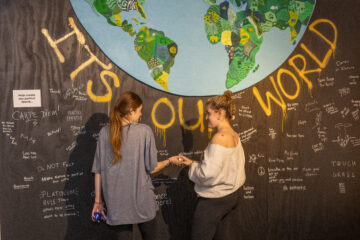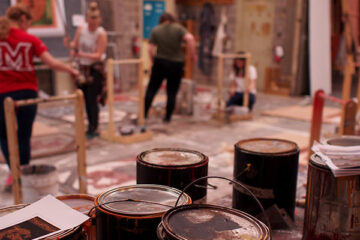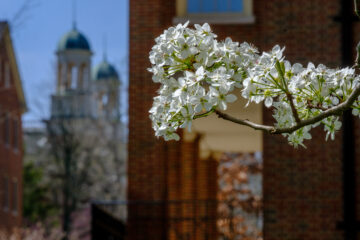Neepwaantiinki, or “learning from each other,” has been the message of the relationship between the Miami Tribe of Oklahoma and Miami University for the past 50 years. ‘
In those 50 years, the Tribe and university have made strides to increase awareness and visibility of native issues and triumphs. That includes the creation of the Myaamia Center on Miami’s campus and the Heritage Award Program.
The Myaamia Center is a joint initiative through the Miami Tribe of Oklahoma and Miami University, created to conduct research, preserve language and culture, and expose Miami students to tribal efforts in language and culture revitalization.
The Heritage Award is a scholarship program providing access to higher education and an opportunity to create a community of Myaamia people in their traditional homelands. The program has flourished, having graduated 100 Myaamia students from Miami University since 1991. There are currently 38 students in the program, the most in program history.
We sat down to chat with one Myaamia student who received the Heritage Award and is active in the Myaamia community. Shelby Carter is a junior public health major.
Shelby talked about how coming to Miami has impacted her Myaamia identity.
“It has allowed me to learn so much more about my culture and heritage and where I come from. Before I came to Miami I knew I was Myaamia but I didn’t really know anything about the tribe in terms of language or even just other cultural norms. So being able to get a college education and also learn more about the tribe has made me grow as a Myaamia person.”
Shelby was already involved with the Miami Tribe of Oklahoma because her uncle had attended Miami University and shared some of his experiences with her family. She had also attended Eewansaapita, a summer camp through the Miami Tribe of Oklahoma, while in middle school and the Tribe’s Annual Meeting when she could while in high school. Before coming to Miami, she had already made three trips to Oklahoma to participate in tribal events.
While at Miami, Shelby’s connection to the Tribe has deepened. Her most memorable experience was attending Winter Gathering in Oklahoma during her first year. “Even though I had been to Oklahoma before, that was a whole different experience because I got to go with other Myaamia students from the Heritage Program.”
She underscored how important it is for the Miami community to know about the deep history between the Tribe and the university. “We lost so much. I think it’s important that we educate our non Myaamia peers about who we are and what we stand for to make the Tribe more known and their presence bigger.”
A deeper understanding of the Tribe in the Miami community would elevate the relationship. And Shelby wants to contribute to that understanding.
““I am not saying that I am going to be the one who makes the difference and makes the change, but I think it’s important that all Myaamia students and staff do as much as we can in the community of Miami to raise awareness about the Tribe,” Shelby said.
Celebrating 50 Years
Throughout 2022, Miami University and the Miami Tribe of Oklahoma are celebrating the 50th anniversary of the relationship between a sovereign Tribal Nation and a public educational institution. This unique partnership is expressed through a shared commitment to neepwaantiinki, ‘learning from each other,’ which has played a key role in the Miami Tribe’s language revitalization efforts and has led to the first generation in nearly 100 years learning to speak the Myaamia language.
A central outcome of this relationship is the Myaamia Center. Established in 2001, the Center serves the Tribe’s research and educational development efforts. One hundred Myaamia community members have graduated from Miami University, where currently an average of 40 Tribe students a semester attend Miami as part of the Myaamia Heritage Program. Learn more at https://stories.miamioh.edu/two-miamis.
Grace Cooper


